Employee knowledge assessment is crucial for various reasons in an organizational setting. Here are some of the main reasons why it’s important:
1. Skill Gap Identification: By assessing what employees know and where they lack knowledge or skills, organizations can identify skill gaps. This helps in targeting training and development initiatives more effectively.
2. Performance Improvement: Regular assessments provide insights into areas where employees can improve. This can lead to increased productivity, better quality of work, and improved business outcomes.
3. Career Development: For employees, understanding where they stand in terms of knowledge and skills can be a crucial motivator. They get a clearer picture of what they need to learn or improve upon to advance in their careers.
4. Safety and Compliance: In industries where safety is paramount or where there are strict regulations (e.g., healthcare, aviation, or manufacturing), regular knowledge assessments ensure that employees are up-to-date with the latest guidelines and can perform their duties safely.
5. Ensuring Competitive Edge: Organizations that regularly assess and update their employees’ knowledge are better positioned to stay competitive. They can adapt more quickly to industry changes and innovate based on the collective knowledge and skills of their workforce.
6. Enhancing Employee Engagement: When employees are given opportunities to learn, grow, and see where they stand, it can boost their morale and engagement. They feel that the organization values their development and is invested in their success.
You might like to know
Create an auto-grading quiz/assessment without any coding – try OnlineExamMaker today!
7. Consistency and Standardization: Especially in larger organizations or those with multiple locations, ensuring that all employees have a consistent level of knowledge about processes, products, or services is important. This ensures a uniform customer experience and smooth internal operations.
8. Retaining Talent: By continually assessing and training employees, organizations show that they value professional development. This can be a critical factor in retaining top talent, as employees often look for workplaces that offer growth opportunities.
Online staff evaluation systems provide a structured approach to measure, analyze, and enhance the knowledge and capabilities of employees. With an array of tools available in the market, choosing the right one can be a daunting task.
In this article, we will delve into the eight best staff evaluation systems tailored for employee knowledge assessments, highlighting their features and benefits.
- 1. OnlineExamMaker
- 2. Cornerstone OnDemand
- 3. Saba Software
- 4. Moodle
- 5. Blackboard Learn
- 6. SuccessFactors
- 7. Articulate
- 8. Kahoot! for businesses
1. OnlineExamMaker
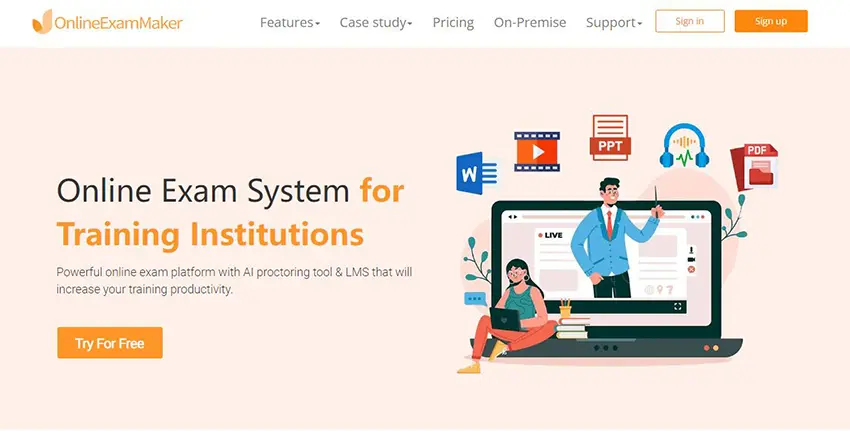
OnlineExamMaker is a cloud-based online assessment & learning platform designed to assist organizations in recruitment, performance evaluation, and employee development.
For staff knowledge evaluation, OnlineExamMaker’s online quiz making software enable companies to identify skill gaps, deliver tailored training content, and assess learning outcomes.
Key Features:
• Personalized Quiz Certificate: Certifications and badges to recognize learner achievements.
• Personalized Learning Paths: Tailored training modules based on individual skill gaps and career aspirations.
• Collaborative Feedback: Engage in continuous dialogue between employees and managers.
• Comprehensive Reporting: Detailed analytics on training outcomes, performance reviews, and more.
• Mobile Learning: Enables employees to access assessments on-the-go, from any device.
Create Your Next Quiz/Exam with OnlineExamMaker
2. Cornerstone OnDemand

Cornerstone OnDemand is a leading talent management system that offers robust employee training and development functionalities. It provides businesses with the tools to create, deliver, and manage training content, along with tools to assess employee knowledge and track their progress. The platform’s intuitive interface, coupled with its extensive analytics, allows for detailed reporting and insights, ensuring that staff evaluations translate into tangible development strategies.
Key Features:
• Learning Experience Platform: Curated content, playlists, and learning assignments for targeted training.
• Predictive Performance: Uses AI to predict and boost employee performance.
• Continuous Performance Management: Enables regular check-ins, goal setting, and feedback loops.
• Compliance Training: Automated tools to ensure corporate compliance.
• Extended Enterprise: Engages non-employees such as partners and vendors in the learning process.
• Recruitment and Onboarding: Streamlined processes to hire, onboard, and train new talent.
3. Saba Software

Saba is a cloud-based talent management solution perfect for organizations looking for a comprehensive tool to evaluate, manage, and develop their workforce. It offers functionalities such as performance reviews, learning management, and succession planning. In terms of staff knowledge evaluation, Saba’s personalized training recommendations and robust assessment tools help companies pinpoint and address skill gaps efficiently.
Key Features:
• Intelligent Recommendations: Offers personalized content and course suggestions based on individual needs.
• Collaborative Learning: Peer reviews, shared content, and discussion forums to foster collaborative learning.
• Talent Pools: Identifies and nurtures top talent for succession planning.
• Virtual Classroom: Offers a space for live, instructor-led training sessions online.
• Advanced Analytics: Provides detailed insights into learning outcomes and performance metrics.
• Engagement Surveys: Tools to measure and analyze employee engagement levels.
4. Moodle
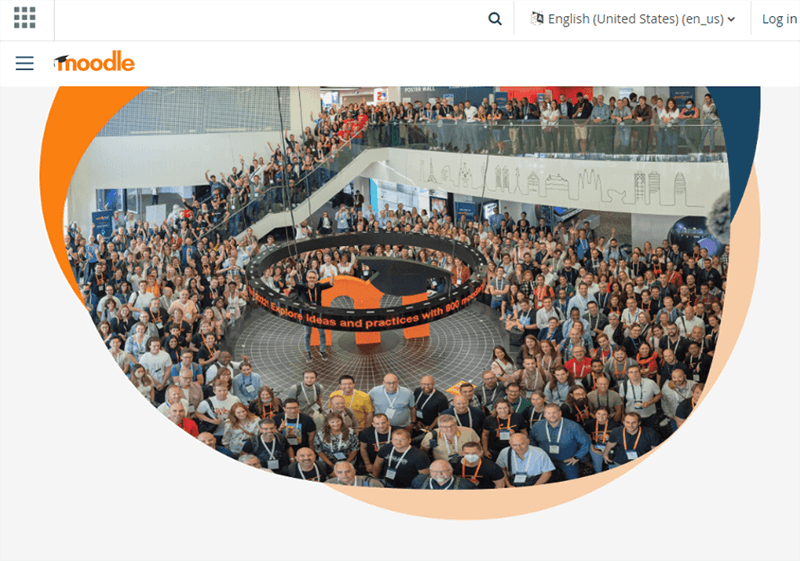
Moodle is an open-source learning management system (LMS) that’s popular in both academic and corporate environments. Companies can leverage Moodle to design courses, deliver training, and evaluate employee knowledge through quizzes, assignments, and feedback. Being open-source, it offers the flexibility for organizations to customize the platform to their unique needs.
Key Features:
• Customizable Open Source Platform: Modify the platform according to specific organizational needs.
• Collaborative Workspaces: Forums, wikis, and databases to support cooperative learning.
• Gamified Learning: Badges, awards, and custom certificates to incentivize training.
• SCORM Compliance: Supports SCORM packages, allowing integration of external course content.
• Mobile Learning: Native mobile app to access courses and content from anywhere.
• Advanced Grading Methods: Rubrics, peer assessment tools, and detailed feedback functionalities.
5. Blackboard Learn

Originally designed for the academic sector, Blackboard Learn has found traction among businesses due to its robust features for online learning and evaluation. With its intuitive course design capabilities and extensive assessment tools, organizations can deploy training modules and assess staff knowledge seamlessly, making it easier to identify areas for employee development.
Key Features:
• Responsive Design: Accessible on any device, ensuring a consistent learning experience.
• Data-Driven Insights: Detailed reports on learner activity, content engagement, and performance.
• Collaborate Ultra: Virtual classroom and conferencing tool integrated directly into the platform.
• SafeAssign: Plagiarism tool to ensure content originality and academic honesty.
• External Integrations: Seamless integration with third-party apps and tools.
• Customizable User Interface: Personalize the platform based on the branding and needs of the organization.
6. SuccessFactors
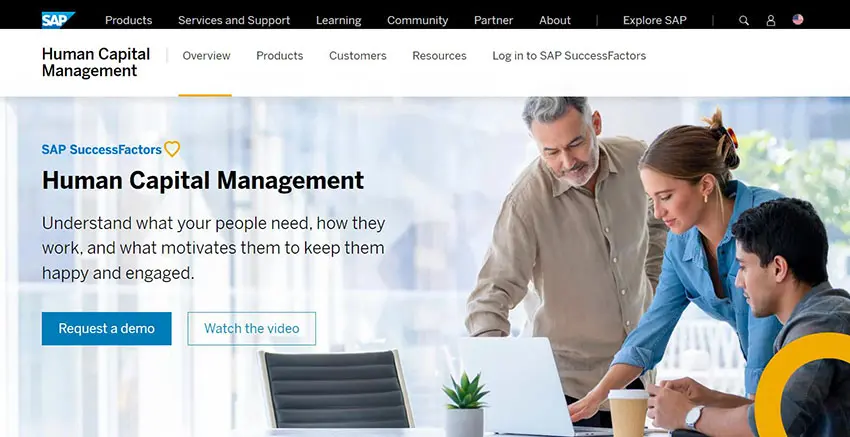
An SAP company, SuccessFactors offers a suite of HR solutions, from talent management to learning and analytics. It’s particularly adept at linking performance management with learning, ensuring that knowledge evaluations inform training and development initiatives. Its cloud-based design facilitates easy integration with other enterprise systems, making it a holistic solution for large organizations.
Key Features:
• 360-Degree Feedback: Comprehensive feedback mechanism involving peers, managers, and self-assessments.
• Goal Management: Align individual goals with organizational objectives.
• Learning Marketplace: Curate and sell course content to external stakeholders.
• Recruitment Module: Streamlines the hiring process with tools like resume parsing and interview scheduling.
• Continuous Performance Management: Regular check-ins and real-time feedback mechanisms.
• Advanced Analytics: In-depth insights with visual dashboards on performance, learning outcomes, and more.
7. Articulate
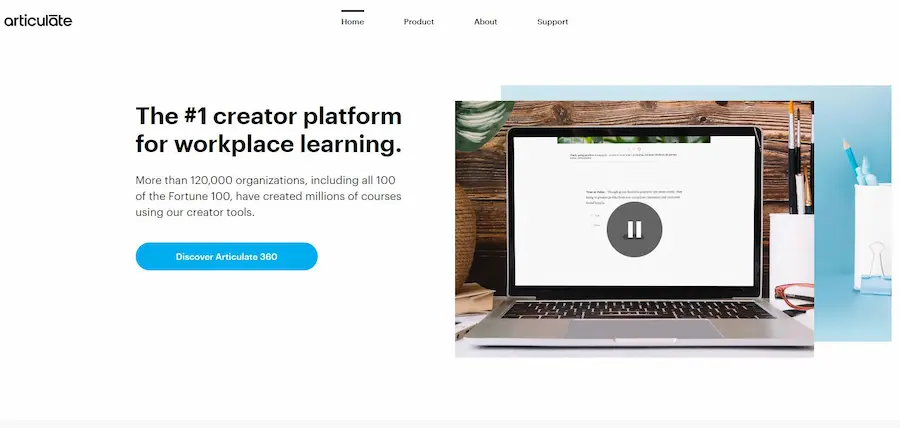
Articulate provides tools to create online training content and courses. While its primary function is content creation, through its platform, companies can deploy training modules and integrate assessment tools. Articulate’s Storyline and Rise are popular tools used for creating interactive, engaging training modules, making knowledge assessments more dynamic and user-friendly.
Key Features:
• Storyline: An intuitive tool for creating interactive, multimedia-rich courses.
• Rise 360: Web-based tool to design responsive courses that look great on any device.
• Engage 360: Tool for building media-rich interactions quickly and easily.
• Review 360: Collaborative space for stakeholders to provide feedback on course drafts.
• Content Library: Access to a vast array of templates and assets to enhance course design.
• Peek 360: Simple tool for recording screencasts and videos.
8. Kahoot! for businesses
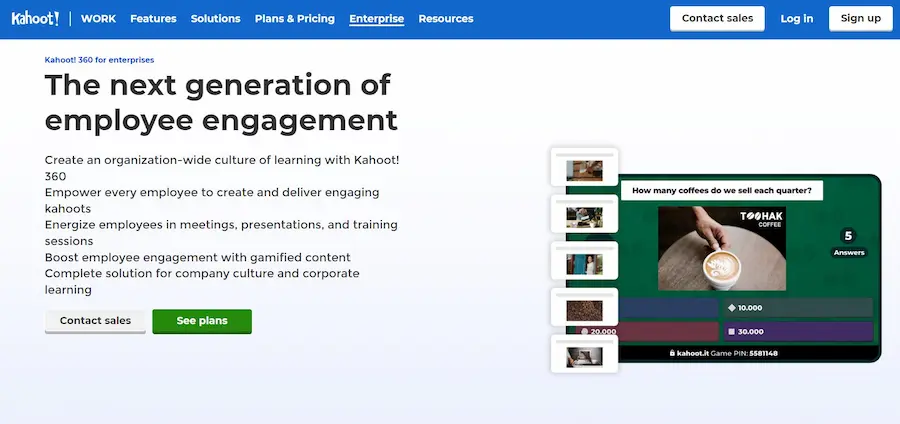
Kahoot! is renowned for making learning fun and engaging with its game-based learning platform. For businesses, it offers a unique approach to staff knowledge evaluation. Instead of traditional quizzes, employees can participate in interactive games, making the evaluation process enjoyable. With its intuitive analytics, managers can quickly gauge the knowledge levels and areas of improvement for their teams.
Key Features:
• Game-Based Learning: Turn any topic into an engaging game to boost learning retention.
• Interactive Presentations: Create slides with interactive polls, quizzes, and feedback prompts.
• Detailed Reports: Analyze game results to understand knowledge gaps and training needs.
• Collaborative Tools: Team modes to foster collaboration and team-based learning.
• Custom Branding: Personalize games with company branding, themes, and images.
• Challenges: Assign games as homework or self-paced learning modules.
In conclusion, the ever-evolving dynamics of the business world necessitate effective tools to gauge the prowess and potential of our teams. The right staff evaluation system not only brings clarity in understanding the current competencies of employees but also paves the way for their future growth. While the aforementioned systems are among the best, it’s essential to select one that resonates with your organization’s specific needs and goals. Investing in a robust evaluation tool is, in essence, investing in the future of your workforce and, by extension, the long-term success of your organization.